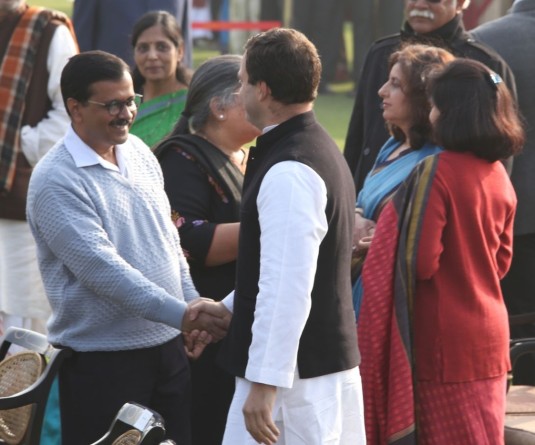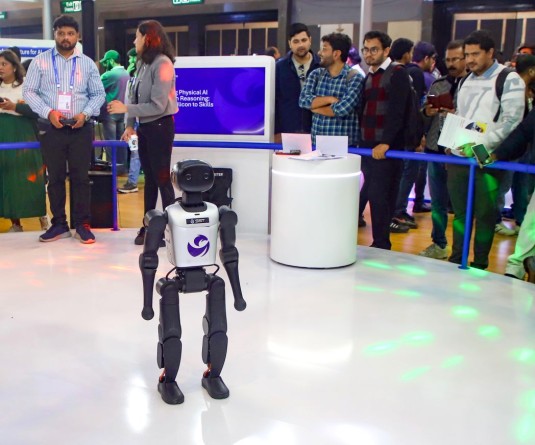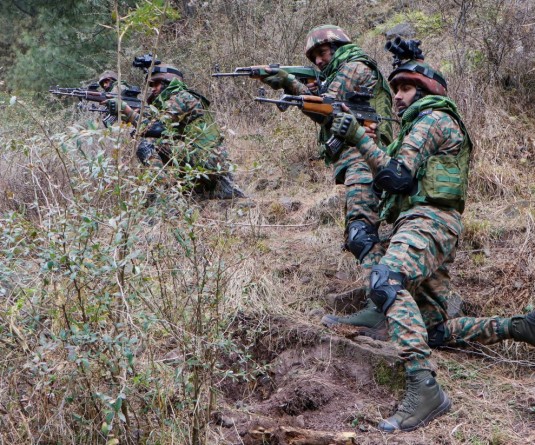IANS Photo
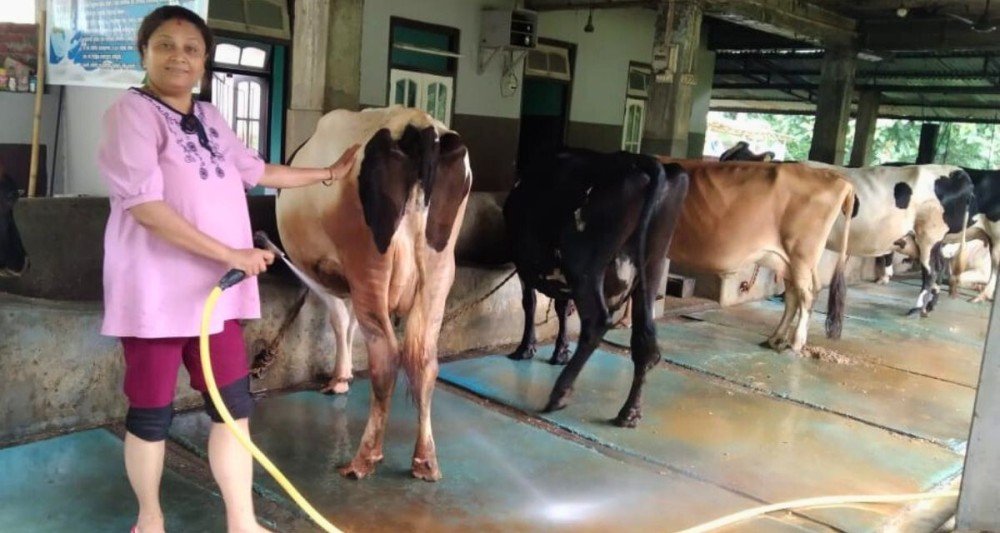
Guwahati (Assam), January 5 (IANS) Amid the vast stretches of tea gardens and the striking mountain views of Soureni in Sikkim lies the modest dairy farm of Tika Khanal (41). As we enter, she can be seen operating a pressure washer to keep her cowshed spic and span.
Khanal initially tried her luck cultivating desi vegetables and pahenlo makkoi (a local maize variety).
In 2015, she decided to start livestock rearing by acquiring two local goats and cattle each. However, she faced hurdles along the way.
“The animals were yielding low milk even during their peak lactation period. Lack of quality fodder and livestock diseases made it extremely challenging,” she shares candidly.
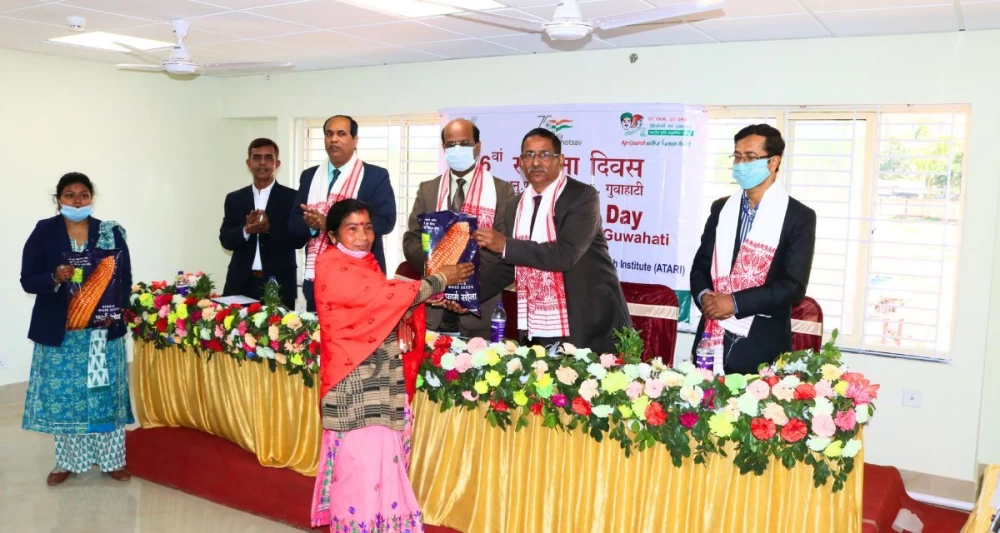
She learnt about the Krishi Vigyan Kendra (KVK) at that time when she was looking for solutions to her problems.
In 2017, she joined the KVK in East Sikkim, seeking knowledge and training. She never had to look back since then as she was provided with the expertise needed to rear enhanced breeds and implement scientific livestock management practices.
“I never missed a training session or field demonstration,” she states.
Milk production has witnessed a remarkable increase after scientific training, with her annual income growing by over 200 per cent.
“I could make Rs 50,000 per month from my four cows earlier. But after putting KVK training to use, I was able to purchase another cow and increase the earnings to Rs 1.25 lakh per month,” she says.
Khanal at present owns seven cows and her income has since then risen to Rs 1.50 lakh per month.
In recognition of her outstanding contributions to the dairy sector, ICAR-Research Complex for North-Eastern Hills Region, Umiam, Meghalaya, conferred the Best Innovative Farmer Award on Khanal in January 2023.
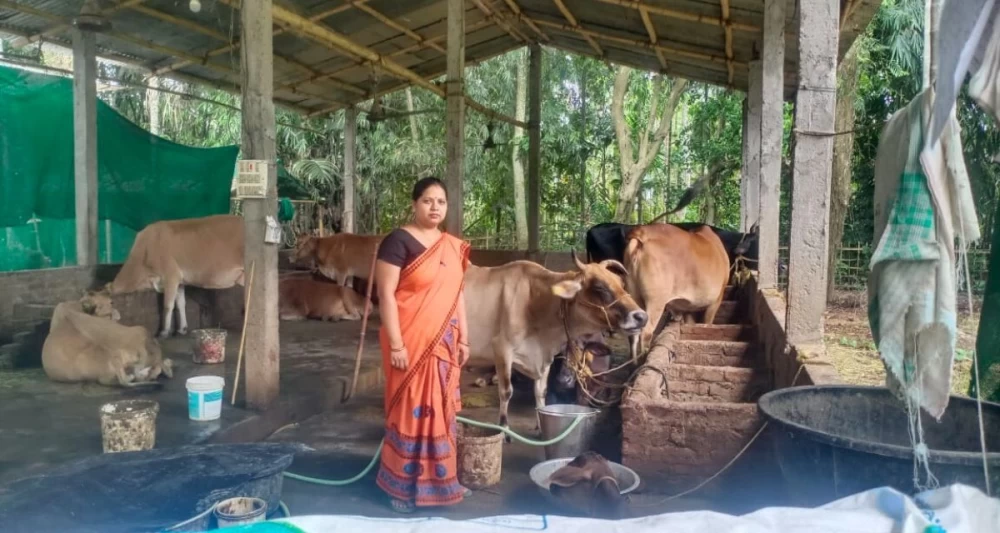
A homemaker, Junuma Mali Deka (35) stumbled upon a training session in marigold production offered at KVK Morigaon, Assam, when she was looking for employment after her marriage to a native of Dandua in the district.
Following the training, she initiated her own nursery in 2018. Her nursery boasts of a diverse array of nearly 60 flower varieties, including rose, hibiscus, marigold, orchid and gerbera.
“The flowers I grow are of superior quality because I use vermicompost only,” she says, adding that gerberas are a popular choice among her customers as they are widely used in bouquets and floral decorations. She sells most of them locally and sometimes in Guwahati.
This is not the only venture that Deka nurtures. Her dairy farm also took root in 2018, initially starting with one cow that yielded around five litres of milk per day. She says professional guidance helped her learn how to maintain the cow, what and how much to feed, and how to keep it healthy and disease-free.
Deka now manages a livestock portfolio consisting of 22 goats and 13 cows, producing and selling 70 to 90 litres of milk daily. This dairy enterprise contributes significantly to her monthly profit of Rs 50,000.
New beginnings
Though Hema Taki (47) was interested in agriculture since her childhood, she took it up only after marriage when her mother-in-law encouraged her. After trying her hand at agriculture and animal husbandry in the remote Runne village in East Siang district, Arunachal Pradesh, she turned to backyard poultry farming in 2011 by purchasing one-day-old Vanaraja chicks, a breed developed by Indian Council of Agricultural Research (ICAR)-Directorate of Poultry Research, Hyderabad, from the Pasighat local market.
Her life took a remarkable turn when she met the officials of KVK East Siang in 2013, a time she embarked on a journey of learning and innovation under their expert guidance. She began employing an indigenous brooder made from bamboo and carton material, equipped with electrical bulbs to provide essential artificial heat to the chicks during their initial three weeks.
She received comprehensive training on crucial aspects, including proper food concentration, and regular deworming and vaccination protocols against Infectious Bursal Disease and Newcastle Disease. Taki currently breeds nearly 200 Vanaraja birds, from which she obtains 13,000 eggs in every batch.
Expressing her gratitude for KVK’s transformative role, Taki states, “I have acquired knowledge about scientific animal rearing, wherein animals are grown in a way that ensures income, employment and food security. The insights from specialist scientists have been instrumental in expanding my business.”
Thanks to her relentless dedication, Taki’s annual income has soared from Rs 32,000 to an impressive Rs 1.65 lakh. In addition to her poultry and animal husbandry ventures, she cultivates advanced varieties of vegetables and rice.
F Gupa Biswakarma (45) had the opportunity to serve as a panchayat councillor of Joyrampur village in Bordoloni block of Assam’s Dhemaji upon her election around 15 years ago. The role offered her a unique perspective on Assam’s untapped agricultural/livestock potential, which had been hampered by a lack of local interest. The realisation prompted Biswakarma to venture into dairy farming by acquiring her first cow with her family’s support.
“My family enjoys milk and milk products, so I started Laxmi Dairy in 2013 to provide them with fresh milk and dairy products,” says Biswakarma, who now owns 45 cows.
In 2022, she underwent a scientific training on milk management at KVK Dhemaji to enhance the quality of her dairy products. “I learned how to extract pure milk, and gained valuable insights into maintaining the health and productivity of cows,” she shares.
Biswakarma has diversified her business by selling homemade paneer and generating substantial profits. She generates a monthly earning of around Rs 1 lakh these days. To help the community, she also provides employment to several villagers.
Lipi Deb Bhowmick (43) starts her day before sunrise. The mother of a toddler, she completes her household chores early and reports at the block panchayat office by 10 am. In her role as the krishi sakhi of West Sonatala village in Khowai district of Tripura, she single-handedly provides emotional, financial and technical support to around 700 women farmers.
“Being a krishi sakhi, I act as a bridge to disseminate information on government announcements to the farmers. I also represent farmers before the government bodies,” Bhowmick informs. She is a strong advocate for organic farming practices and passionately encourages women to adopt the use of vermicompost over conventional fertilisers. Under her able guidance, all the women farmers she deals with have been diligently adopting sustainable and eco-friendly agriculture.
Bhowmick regularly receives incentives from the Tripura Rural Livelihood Mission, however it depends on the number of women who benefit from the government scheme or how many she has supported. “The more the merrier. My monthly earning is between Rs 10,000 and 15,000 now. Two years ago, before becoming a krishi sakhi, it was nil,” she says. She also successfully cultivates 25 cauliflowers each of purple and yellow colours.
A helping hand
First established in Sonitpur district of Assam in 1981, 126 KVKs function across the Northeast at present. Besides providing hands-on training on latest technologies, it supports farmers with necessary requirements of seeds and equipment. It bridges the gap between the technology developed at research institutions and its adoption at the field level by farmers through training and demonstrations.
“With our technical help, women have now acquainted themselves with paddy transplanters and paddy drum seeder [for sowing germinated seed]. They get very involved in the value addition process as well. Earlier, women’s interest in such activities were minimal. Moreover, many rural women were not allowed to do such work. By conducting one-to-one discussion and holding awareness meetings, we exhorted them to come out," Dr Rijusmita Sarma Deka, a senior scientist and head of KVK Morigaon, tells 101Reporters.
ICAR-Agricultural Technology Application Research Institute (ATARI) oversees and supports the activities of KVKs, providing financial and infrastructural assistance for their effective functioning. Currently, 47 KVKs are affiliated to it, with 17 functioning in Arunachal Pradesh, 26 in Assam and four in Sikkim.
According to an ICAR research in nine states, women are responsible for a significant portion of agricultural activities, contributing to major crop production (75 per cent), horticultural endeavours (79 per cent), post-harvest work (51 per cent) and animal husbandry and fisheries (95 per cent).
Dr Kadirvel G, Director, ATARI Zone VI, notes, “Northeastern women farmers are performing exceptionally well. They adapt to changes and new trends efficiently.”
Dr Eloni Vida, Subject Matter Expert (Home Science), KVK East Siang, attests to women’s adaptability to new changes. In her 15 years of experience working with farmers, she has noticed their enthusiasm for experimenting with new technologies related to fruits, seeds and breeds.
“It is heartening to see that over 80 per cent of the participants in our training sessions are women. Many even bring their infant children along,” she states.
According to KVK Khowai Head Dr Manoj Singh Sachan, women possess a better understanding of nutritional values as compared with men because they are primarily responsible for providing food for their families.
Dr Janak Kumar Singh, Head, KVK East Sikkim, says that with support of KVK, ICAR and state governments, women in the Northeast are turning to entrepreneurship.
“They are no longer just farmers; they are becoming entrepreneurs, creating a brighter future for themselves, their families and communities.”
(Sayantani Deb is an Assam-based freelance journalist and a member of 101Reporters, a pan-India network of grassroots reporters.)


